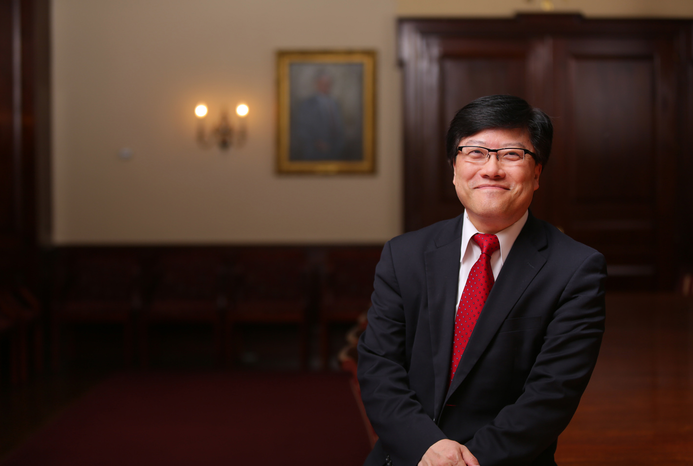Dr. Augustine M.K. Choi, the Stephen and Suzanne Weiss Dean of Weill Cornell Medicine, has been named to Modern Healthcare’s 50 Most Influential Clinical Executives list.
This year’s list, revealed June 21, honors health care leaders whose organizations continued to innovate amid the COVID-19 pandemic, achieving operational goals while also optimizing the health-care experience for patients and preventing physician burnout. Also included on the list are Weill Cornell Medicine alumni Dr. Anthony Fauci ’66, director of the National Institute of Allergy and Infectious Diseases of the National Institutes of Health, and Dr. Cheryl Pegus ’88, executive vice president of health and wellness for Walmart.
“I am honored and humbled to be listed among these giants of health care, whose leadership I greatly admire,” said Dr. Augustine M.K. Choi, the Stephen and Suzanne Weiss Dean of Weill Cornell Medicine. “The COVID-19 pandemic has tested us all in ways we never could have imagined and underscored the importance of medicine to keep people healthy and allow them to live their lives. Our fellowship of health care workers is more important than ever, and I am profoundly grateful to our Weill Cornell Medicine community and our peers for their tremendous work—this year and always.”
As New York City emerged as the pandemic’s epicenter in spring 2020, Dr. Choi, working with his senior leadership team and in coordination with NewYork-Presbyterian, took rapid action to ensure that Weill Cornell Medicine could meet the surge in COVID-19 cases. The institution redeployed more than 550 clinical staff to the emergency department, intensive care units, hospital floors, and Workforce Health and Safety to help care for patients with COVID-19. After a two-month suspension of routine in-person patient care, Dr. Choi, working with NewYork-Presbyterian and Columbia University Irving Medical Center leadership, carefully resumed such care in May 2020 with proper COVID-19 mitigation practices.
Emphasizing mental health and well-being for Weill Cornell Medicine faculty and staff, Dr. Choi expanded childcare support, added transportation options to safely come to campus and provided temporary housing for health care workers. The institution provided 427,000 meals to front-line health care workers from April to July 2020, established relaxation rooms for staff to decompress and expanded mental health services to all employees. A COVID-19 Employee relief fund provided financial assistance to employees experiencing hardship because of the pandemic.
Recognizing the importance of understanding SARS-CoV-2, the virus that causes COVID-19, Dr. Choi established a COVID-19 Research Grant program—funded by the institution’s Board of Fellows and other donors—to support studies aimed at understanding fundamental aspects of the disease, the body’s immune response and social determinants of health that affect COVID-19 outcomes. Weill Cornell Medicine faculty published the first from-the-front-lines report on COVID-19’s U.S. clinical characteristics, and overall faculty have published some 700 studies on the disease. The institution has been a site for more than a dozen COVID-19 clinical trials, including two vaccine studies.
Dr. Choi has also encouraged a culture of innovation, diversity and inclusion at Weill Cornell Medicine, even amid the pandemic. He unified Weill Cornell Medicine’s entrepreneurship ecosystem; led a reimagining of the foundational science landscape; expanded the use of telemedicine; and continued to implement a scholarship program, established in 2019, that allows medical school students who qualify for financial aid to graduate debt free.
“I am proud of these achievements, made possible by the incredible dedication of our donors, physicians, scientists and staff who instantly mobilized to tackle one of the most challenging health care experiences of our lifetimes,” Dr. Choi said. “Weill Cornell Medicine shows its mettle time and again, especially in moments of need; it’s in our DNA.”

